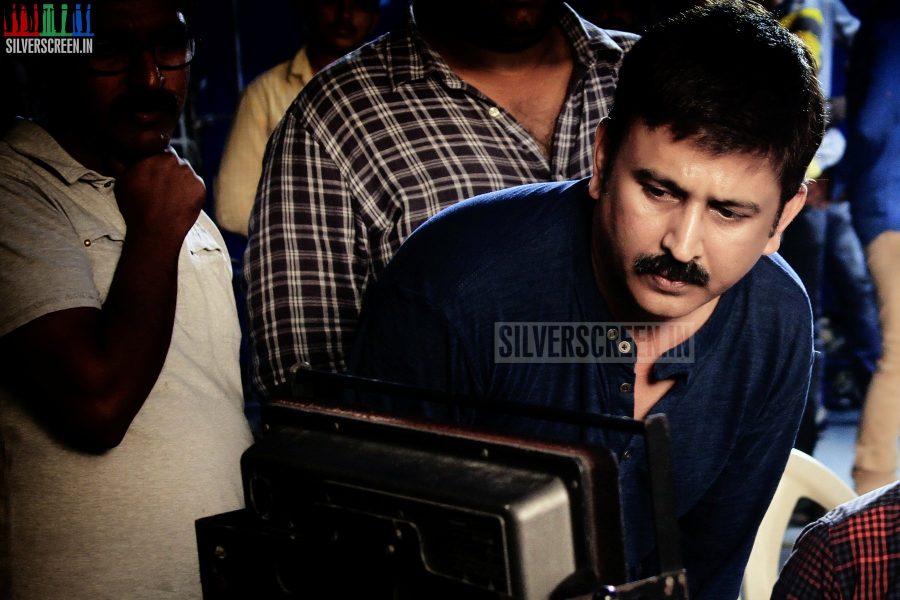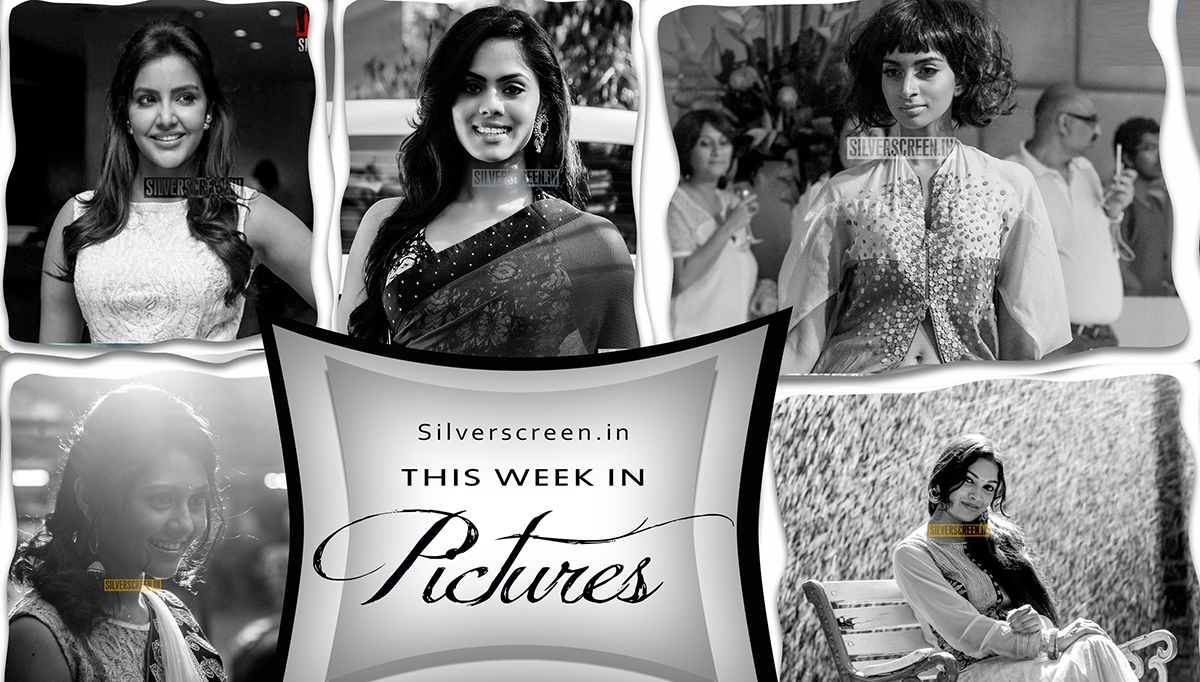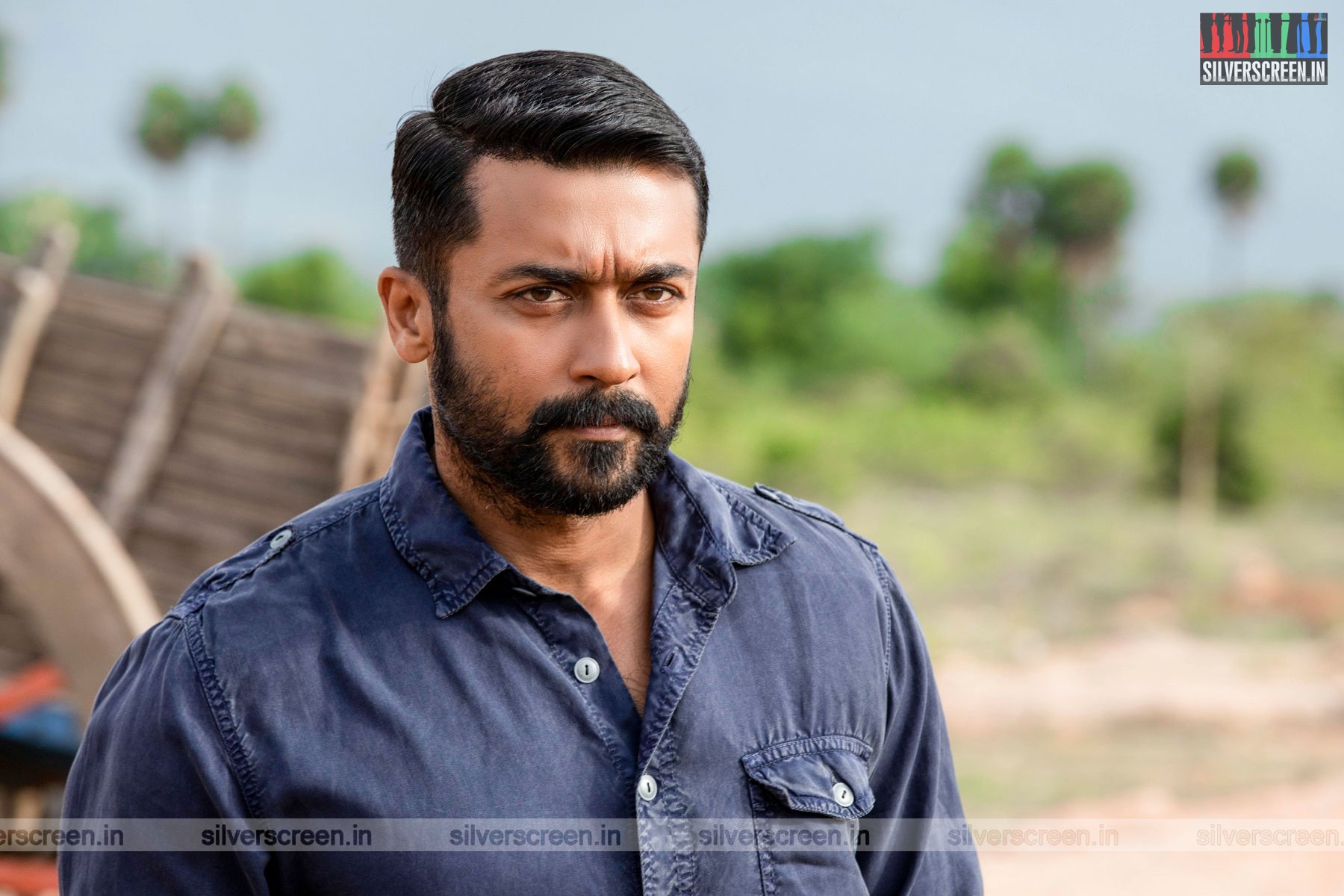10 am.
As Ramesh Aravind enters the restaurant of a boutique hotel in Alwarpet, I allow myself a smile. I see Keladi Kanmani’s Sashi strolling towards me; matured yes, but vestiges of that boyish charm still intact.
“We won’t talk much about Uttama Villain, okay?” he greets, his brown eyes twinkling.
“Of course,” I tell him. “Not much.”
A chuckle.
I switch my recorder on cue.
Wait, he gestures, and calls the waiter.
“Thambi, antha TV konjam off pannunga.”
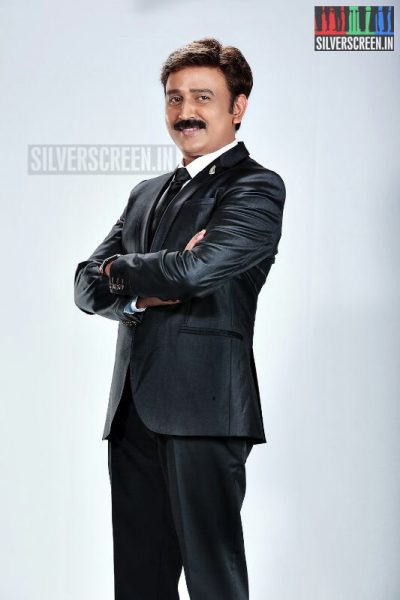
Actor Ramesh Aravind
Directors repeat him, and actors love to be in the same frame with him.
Because Ramesh works without an ego. That’s important, he nods sagely at me, “and that’s how it must be.”
He still draws a dispassionate image of cinema, though. And of the people in it. He is quite rational about it. “I admire a lot of them, but I have never been in awe,” he begins solemnly, “it affects your performance, and I think that applies to most of us. I am a very secure actor who is extremely happy in my space. I am game to work with anybody.”
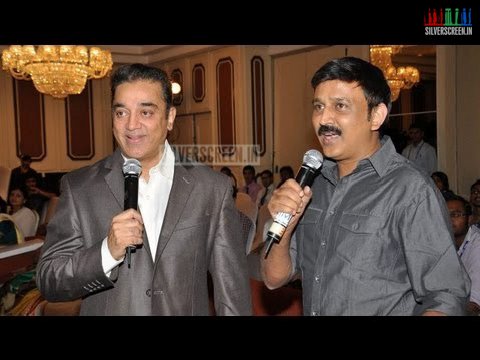
Actor Kamal Haasan and Ramesh Aravind
He leans forward, and sips the sugarless tea. It arrived at the “right stage of his career”, he says. He was looking forward to doing something different in life. He had ideas. But not the resources or market. “When Kamal said you should direct it, it gave me clarity. Otherwise, you know, you are caught up in the muddle of daily things.”
The next day, he stopped doing everything else.
He didn’t sign a single Kannada film after that. And for an actor who loves to multi-task, it was a tough call. Also, it happened to be the first film he was directing where he was not the lead actor. “It was a big responsibility,” he explains, “I wanted to give it my all. It was a challenging script, and that was my best takeaway.”
Kamal is more a mentor, he admits. So there was no typical hero-director relationship with him. But he did realise something, though: that being a co-star is pretty smooth, but when you meet as a director and an actor, “it is possible the friction can escalate into something very unpleasant.” There were creative differences with Kamal, yes. “I would be lying if I say it was a smooth ride. But then, there were two creative minds at work.”
A lot of people had warned him against taking up Uttama Villain. Their reason was quite simple: it might affect the personal equation he shared with Kamal. “But then,” Ramesh interjects, “both of us are mature. I didn’t want to miss that collaboration thinking about a possible change of equations.”
He was the emcee at the 50th day celebrations of Sagara Sangamam when he first met Kamal. Ramesh was in engineering college then. “I was always his admirer,” he recalls, “Rajini and Kamal were the biggest stars of our time. You can’t escape that influence.”
Years later, they would meet on the sets of Punnagai Mannan as co-stars. “Kamal was dressed as Charlie Chaplin for Mamavukku Kuduma song,” he recalls fondly.
Ramesh was originally supposed to be the “flashback hero” for Revathi, but his role was edited out.
Uttama Villain’s script blew him away, and so did Kamal’s commitment. It was Hollywood-style – a well-written screenplay, packed with detail, and dotted to precision. So much so that when he requested Kamal to replace two lines in the script, he took a day to come up with a perfect set of lines.
Also, Ramesh would consciously stay away from the script for 10 or 20 days to get an objective view of it. “When you are constantly on it, things start working against you,” he shrugs, “Crazy Mohan would often drop by for discussions, otherwise, the script and dialogues are Kamal’s all the way.”
According to Ramesh, the movie has two aspects: there’s a sensitive side, and “a new type of comedy”. Essentially though, it is something that he has always been doing. But, on a bigger scale. The story is set in two centuries: 8th and 21st. While the early century deals with a lot of folk art from that era, there’s also an amalgamation of Theyyam, Koothu and other folk forms.
Everything is fictitious, of course.
Thankfully, Ramesh suddenly exclaims, they had similar sensibilities. Kamal and him. Especially in humour. “I used to tell him, avalo jerk vendam sir, ithu namma comedy kedayathu. And he will be very happy as that’s how he likes his comedy. He doesn’t like an exaggerated shoulder shrug or widening of eyes for the sake of comedy. But then, it is only natural that we think alike – if he learnt from K Balachandar sir, I learnt from both KB and Kamal.”
He terms comedy as “the most dangerous genre” to deal with. But when things work in perfect sync, you get a film like Panchathanthiram, he says, adding that he grew up on that kind of comedy: Crazy Mohan and K Vishwanath’s dramas. He also loves “saying profound things” in his films, but “in a nice happy way”.
Dark, morbid movies are not his idea of entertainment.
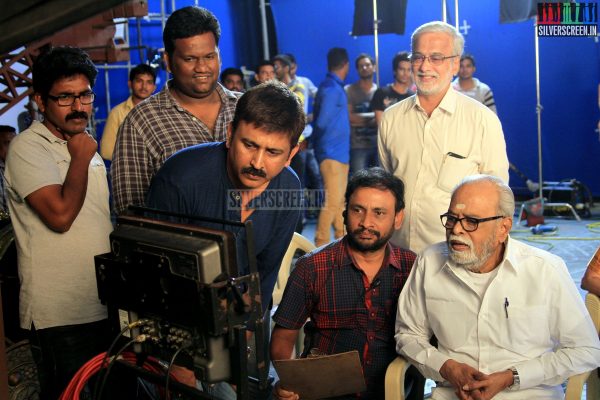
Actor Ramesh Aravind
So are we in for a cinema within a cinema? I ask curiously.
“I don’t know,” he laughs,” you can draw your own conclusions.”
They have also tried various innovations with make-up. He admits the local Theyyam make-up artistes took his breath away by their sense of aesthetics and detailing.
And, the song Sara Sara sold them on Ghibran. “Talented, with a nice attitude” is how Ramesh sizes him up. “It’s a big deal to have talented people with pleasing attitudes on the sets. With such people, you can make a movie like The Lord of the Rings just like that, without making much noise.”
Yes, Uttama Villain is the biggest film he has done, and probably the most challenging in terms of execution. “You look at it this way. For a two-hour long film with Kamal, we shot for 800 hours with him. And, that’s not counting the one-and-a-half years of brainstorming.”
He suddenly leans back in his chair, amused.
“Hey, didn’t I tell you we won’t talk about this?”
[quote align=’left’]Dark, morbid movies are not his idea of entertainment.[/quote]We travel back in time. 1986 to be precise, when Ramesh was in his last year of college. He was also anchoring a popular show on a Kannada channel then. And that was when K Balachander called him to Chennai, and offered a film. “Just learn how to dance, and we will do it,” was the brief.
It would be for the remake of Sollathaan Ninaikkiren in Kannada.
And, Kamal had starred in the original.
KB had later introduced him in Telugu as well. He still remembers the press meet for his first film.
“Na yen unna nerupula sagadichen theriyuma?” KB had told him then, “Yenna, un kannula nerupu therinjidhu.”
Ramesh laughs loudly, bringing me back to the present.
It is important to start one’s career with the likes of K Balachander, Balu Mahendra or Mani Ratnam, he reflects thoughtfully. “You respect cinema for the force it commands. You appreciate its grandness, and don’t get attracted to the wrong things. You could learn the minute details of filmmaking and acting just by being with them.”
Kamal, he says, had always believed that he had the mind of a director, and Ramesh concedes that he was inclined towards direction right from his fourth film. “I learnt on the job. 150 films on the floor. That’s the best college you can ever go to.”
[quote align=’right’]“Na yen unna nerupula sagadichen theriyuma?” KB had told him then, “Yenna, un kannula nerupu therinjidhu.”[/quote]He thinks one would be more accepting of other’s opinions as they grow older. “Don’t take crap, but when the right guy says it with the right intention, accept it.”
Have you ever put your foot down? I ask impulsively. He is amused by the phrase.
“Why would you want to put your foot down, man? You can very sweetly take it in hand and kiss it.”
“One should learn how to control your impulses. Try not to flare up in that moment, and some wonderful things will happen later. Simplify your life, and unless there is a big payoff, don’t complicate it,” he lists out his survival tips.
Uttama Villain has some massive stars, yes. There’s Urvashi with over 500 movies to her credit, Jayaram with over 400, and Kamal with about 300 – that’s more than 1000 films of experience in total, he exclaims. “You rub someone the wrong way, and you lose 400+ years of filming experience. Is it worth it?” he asks rhetorically.
Showing-off is a sign of immaturity – “high school attitude” – he declares. “Kurosawa made simpler films as he grew up.”
[quote align=’left’]“In spite of all my preparation, something magical will happen at the last minute. That’s the power of cinema.”[/quote]Ramesh has a photographic memory of every film that he worked on. Panchathanthintram remains a favourite. It was a madcap set, he grins, savouring the memory, “with brilliant story tellers all around. Be it Jayaram, Urvashi, Kamal or Yugi, they would have a fantastic tale to narrate. We never used to run out of conversations.” Jayaram would make them roll on the floor in laughter with his mimicry. Urvashi would narrate a tale in all seriousness, and by the time she finished, the set would erupt in laughter.
He was more amazed, the actor admits, by their ability to follow directions to the T despite knowing the intricacies of filmmaking. “Urvashi can direct a film easily. Yet she never questions the director. It’s very tempting to cross your hierarchical borders all the time. To hold back all the stuff you know is amazing.”
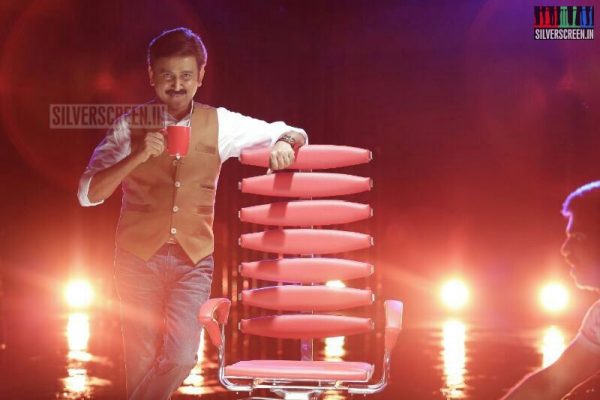
Actor Ramesh Aravind
Ramesh narrates an incident. “During a shot, Balu asked me to stand near the window as there was more light. I told him, ‘No, I don’t feel like getting up.’ To my utter disbelief, he immediately changed the shot.” That is one way of doing cinema, he says, “making your actors feel comfortable.”
Left to Balu Mahendra, declares Ramesh, Sathi Leelavathi would have become something like Marupadiyum; intensely emotional. But when Kamal and Crazy Mohan came on board, they brought along the fun element. “Bringing creative minds into a film can add a different flavour to a film.”
As an actor, Ramesh prefers doing roles that justify his image. He doesn’t mind dark and negative characters as long as they have an extra dimension. He did a succession of unrequited lover roles before he switched to comedy. And soon realised that it was his forte.
He does admit to have knowingly been a part of a lot of “trashy films” for friends, though. “It might have looked like a bad career move,” he pauses, “but the goodwill you gain from it, it comes back in a nice way. It has to me, at least.”
The creative process of filmmaking still excites him. “In spite of all my preparation, something magical will happen at the last minute. That’s the power of cinema.”
Childhood influences, Ramesh observes, define an actor. “It might be a drama rehearsal, a script you had read or even a song. For me, it was those yearly get-togethers at my grandparents’ home, when we used to stage a skit with my mother’s sari as the curtain. Every actor will have a story like that,” he smiles.
A flop hurts even now, he admits, adding that success is easier to accept, but you don’t understand that it won’t be with you all the time. “You tend to fall now and then. A hit or flop has not changed me.”
Ramesh thinks that “Reviewing is an art of its own. But it is inappropriate to loosely comment on technical intricacies like editing and sound. It is easy to judge performances, but definitely not the other aspects of filmmaking.”
Has there been instances when he has found it difficult to shrug off his on-screen image? “Not really. It was very close; my on and off screen image – the boy next door. The minute I finish a shot, I can come out of it.”
Having said that though, he admits the negative character in Amrita Varshini “psyched” him out. He played a man who falls in love with his best friend’s wife. During the climax, where he kills his friend and faces his pregnant wife, he had an attack of migraine, he tells me.
Recommended
Ramesh is currently hosting a talk show on TV – Weekend with Ramesh, and he reveals that it is no cakewalk. “In cinema, you can fake it and get away with it; but on TV, they catch you immediately. They can hate you overnight. I am being myself on TV, I love that role.”
He is now eagerly awaiting the release of Uttama Villain. The experience has made him a more confident man, he declares. He wants to direct bigger films now.
A nervous moment in front of the camera? I ask as a parting shot. “No,” Ramesh declares vehemently, “not even during the first ever shot I’d done. I had to hug the heroine and lip-sync to the song. I was always at home on the sets. Right from day one.”
The Ramesh Aravind Interview is a Silverscreen exclusive.
